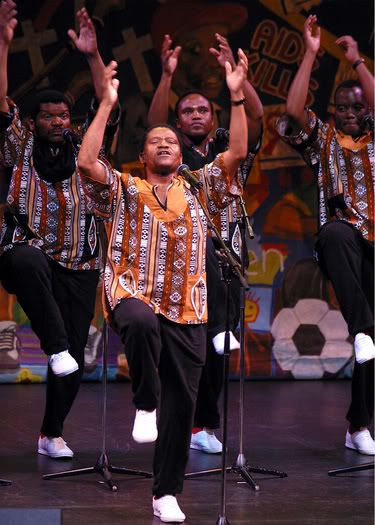Ladysmith Black Mambazo
Last night my wonderful wife and I had the privilege of seeing Ladysmith Black Mambazo in concert at the Leeward Community College theater.
LBM came into being in 1961 when founder, Joseph Shabalala, brought friends and family members together in singing an a cappella singing style derived from traditional South African isicathamiya music. After winning every song contest available they became an icon for the Zulu communities in South Africa where they suffered under the oppression of Apartheid. In 1986 they gained world-wide recognition by way of their collaboration with Paul Simon on his historic "Graceland" album. In many ways they became a cultural symbol for Black African pride, hope and determination to gain freedom and justice in their native land.
Now, celebrating the 11th anniversary of the dismantling of Apartheid, Ladysmith Black Mambazo is on a world tour, sharing their considerable talent, humor and culture while, at the same time, promoting their latest albums, "Raise Your Spirits High" (nominated for a 2004 Grammy) and their just-released "No boundaries" (where they are accompanied by the classical strings of the English Chamber Orchestra).
The isicathamiya vocal style was not strange to our ears, partly because of the Paul Simon album and the resulting (but short-lived) popularity of such music in America. More to the point, the "call-response" style of music grounded with a repetitive choral background counterpointed by a solo voice adding lyric melodic and rhythmic variations reflects a traditional African vocal style first brought to the Americas in the hearts and minds of slaves.
Jazz and Gospel are two of the modern reincarnations of this type of music which can be heard in almost any African-American Christian congregation on any given Sunday morning. This reality, I think, is at the crux of Mambazo's influence and popularity in South Africa. They are a symbol of the strength and enduring power of traditional African culture. Whereas the Boer/Afrikaaner culture has largely collapsed into oblivion, the very culture that the Afrikaaners had tried to suppress and destroy has survived.
As a Christian I must believe that truth is ultimately stronger than falsehood and that freedom is stronger than oppression. The mere existence of Ladysmith Black Mambazo and the triumph of their world tour is, I think, evidence that my faith is well-founded.
The performance was sold out and they received two standing ovations. This is how it should be. They have not only earned it, but they deserved it.
Now, celebrating the 11th anniversary of the dismantling of Apartheid, Ladysmith Black Mambazo is on a world tour, sharing their considerable talent, humor and culture while, at the same time, promoting their latest albums, "Raise Your Spirits High" (nominated for a 2004 Grammy) and their just-released "No boundaries" (where they are accompanied by the classical strings of the English Chamber Orchestra).
The isicathamiya vocal style was not strange to our ears, partly because of the Paul Simon album and the resulting (but short-lived) popularity of such music in America. More to the point, the "call-response" style of music grounded with a repetitive choral background counterpointed by a solo voice adding lyric melodic and rhythmic variations reflects a traditional African vocal style first brought to the Americas in the hearts and minds of slaves.
Jazz and Gospel are two of the modern reincarnations of this type of music which can be heard in almost any African-American Christian congregation on any given Sunday morning. This reality, I think, is at the crux of Mambazo's influence and popularity in South Africa. They are a symbol of the strength and enduring power of traditional African culture. Whereas the Boer/Afrikaaner culture has largely collapsed into oblivion, the very culture that the Afrikaaners had tried to suppress and destroy has survived.
As a Christian I must believe that truth is ultimately stronger than falsehood and that freedom is stronger than oppression. The mere existence of Ladysmith Black Mambazo and the triumph of their world tour is, I think, evidence that my faith is well-founded.
The performance was sold out and they received two standing ovations. This is how it should be. They have not only earned it, but they deserved it.



<< Home